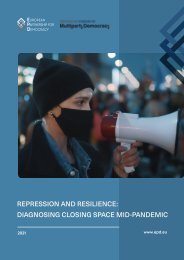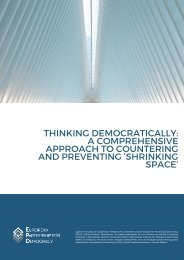Political Party Guidelines Eng
You also want an ePaper? Increase the reach of your titles
YUMPU automatically turns print PDFs into web optimized ePapers that Google loves.
clearly, this was not objective behaviour and not equal treatment of women and men. Simply put: it was
discriminative.
The problem is that we are not aware of this discriminative thinking of ours. It is a bias which is deeply
ingrained in us, as we have, since the day we were born, been socialized to think in a certain way of
men, and in another of women. We believe that a) we are objective, b) we always choose the person who
is most competent, and c) men tend to be more competent for most positions.
When in some universities exam answers were given anonymously, the markings of young women
went up, those of young men went down. Some companies have started inviting anonymous CVs from
applicants for their open positions, and as a result women and people belonging to ethnic minorities
have been called to job interviews more often than before. And, as mentioned earlier on, research
also indicates that big companies which are led by women do better than those led by men. Thus, this
biased thinking of ours is giving us results which are not as good as they could be, if we were more
open-minded.
It must be stressed that discrimination, on top of being economically short sighted, is wrong. It is
against the constitution of Myanmar, and it is against all democratic principles.
Have you come across discrimination in your own life? What kind? How did it feel? Was direct or
indirect? Do you think you might have, yourself, in some incidence practiced discrimination towards
another person? If yes, try to think what you could have done differently.
3.7 Harmful traditional practices
What are so called “harmful traditional practices” ? UN has a listing of traditional customs which
impede the fulfilment of gender equality and of women’s and girls’ rights. They include practices like
child marriage, forced marriage, dowry-related violence or harassment, bride price, female genital mutilation,
so-called “honour crimes”, stove burning, acid attacks, forcing the victim of rape to marry the
perpetrator, “pay-back” or revenge rape, disinheritance, maltreatment of widows and polygamy.
UN has a useful document of information on these: Good Practices in Legislation on “Harmful Practices”
against Women. 28
GENDER EQUALITY: A SHORTCUT TO DEVELOPMENT AND PROSPERITY 17


















